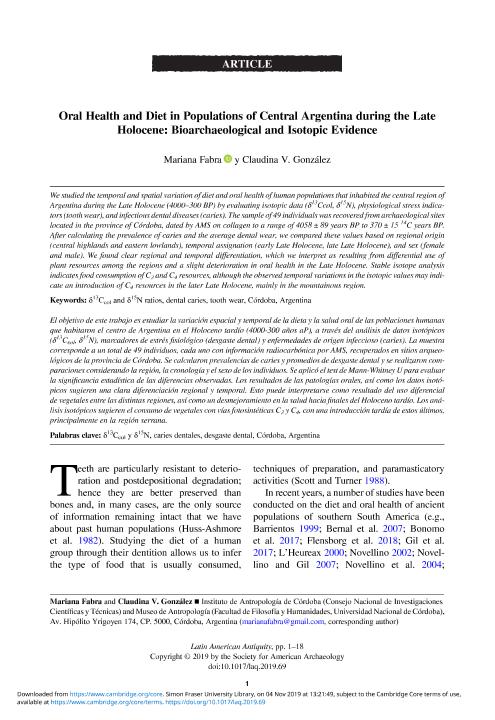Artículo
We studied the temporal and spatial variation of diet and oral health of human populations that inhabited the central region of Argentina during the Late Holocene (4000-300 BP) by evaluating isotopic data (δ13Ccol, δ15N), physiological stress indicators (tooth wear), and infectious dental diseases (caries). The sample of 49 individuals was recovered from archaeological sites located in the province of Córdoba, dated by AMS on collagen to a range of 4058 ± 89 years BP to 370 ± 15 14C years BP. After calculating the prevalence of caries and the average dental wear, we compared these values based on regional origin (central highlands and eastern lowlands), temporal assignation (early Late Holocene, late Late Holocene), and sex (female and male). We found clear regional and temporal differentiation, which we interpret as resulting from differential use of plant resources among the regions and a slight deterioration in oral health in the Late Holocene. Stable isotope analysis indicates food consumption of C3 and C4 resources, although the observed temporal variations in the isotopic values may indicate an introduction of C4 resources in the later Late Holocene, mainly in the mountainous region. El objetivo de este trabajo es estudiar la variación espacial y temporal de la dieta y la salud oral de las poblaciones humanas que habitaron el centro de Argentina en el Holoceno tardío (4000-300 años aP), a través del análisis de datos isotópicos (δ13Ccol, δ15N), marcadores de estrés fisiológico (desgaste dental) y enfermedades de origen infeccioso (caries). La muestra corresponde a un total de 49 individuos, cada uno con información radiocarbónica por AMS, recuperados en sitios arqueológicos de la provincia de Córdoba. Se calcularon prevalencias de caries y promedios de desgaste dental y se realizaron comparaciones considerando la región, la cronología y el sexo de los individuos. Se aplicó el test de Mann-Whitney U para evaluar la significancia estadística de las diferencias observadas. Los resultados de las patologías orales, así como los datos isotópicos sugieren una clara diferenciación regional y temporal. Esto puede interpretarse como resultado del uso diferencial de vegetales entre las distintas regiones, así como un desmejoramiento en la salud hacia finales del Holoceno tardío. Los análisis isotópicos sugieren el consumo de vegetales con vías fotosintéticas C3 y C4, con una introducción tardía de estos últimos, principalmente en la región serrana.
Oral health and diet in populations of Central Argentina during the late holocene: Bioarchaeological and isotopic evidence
Fecha de publicación:
28/10/2019
Editorial:
Cambridge University Press
Revista:
Latin American Antiquity
ISSN:
1045-6635
Idioma:
Inglés
Tipo de recurso:
Artículo publicado
Clasificación temática:
Resumen
Palabras clave:
ARGENTINA
,
CÓRDOBA
,
DENTAL CARIES
,
TOOTH WEAR
,
Δ13C COL AND Δ15N RATIOS
Archivos asociados
Licencia
Identificadores
Colecciones
Articulos(IDACOR)
Articulos de INSTITUTO DE ANTROPOLOGIA DE CORDOBA
Articulos de INSTITUTO DE ANTROPOLOGIA DE CORDOBA
Citación
Fabra, Mariana; Gonzalez, Claudina; Oral health and diet in populations of Central Argentina during the late holocene: Bioarchaeological and isotopic evidence; Cambridge University Press; Latin American Antiquity; 30; 4; 28-10-2019; 818-835
Compartir
Altmétricas




